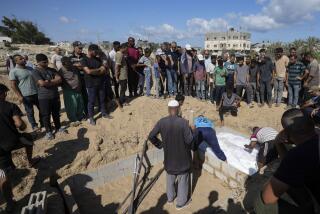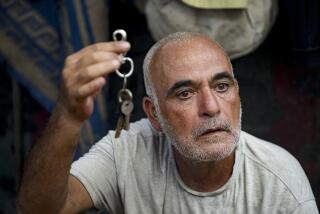Lives of some Kurdish widows frozen in time
BARZAN, IRAQ — Patience, the mothers begged their children. Saddam Hussein will fall. Liberty will come. Your father will return.
Years went by. The regime fell. Prison doors were opened. Mass graves were unearthed.
Still, the women wait.
“We still have not given up hope. We expect our husbands to return,” says Bahar Suleiman, one of the thousands of black-draped women of this valley of widows.
She sits on a red plastic chair in the courtyard of a one-story cinder-block home she shares with six other women who have lost their husbands.
A mountain breeze tempers the August sun. Her reddish locks tumble from the black head scarf wrapping a face frozen in a grimace.
“I still believe that someday my husband will walk through that gate there,” she says.
Barzan is the ancestral homeland of the Barzani family, which dominates politics here in the semiautonomous region known as Iraqi Kurdistan. It is the birthplace of Mustafa Barzani, the Kurdish guerrilla leader who fought for decades against the Baghdad government and is now buried here. His son, Massoud, is president of the Kurdistan region and a major power broker in Iraqi politics. A grandson, Nechirvan Barzani, Massoud’s nephew, is the prime minister.
Barzan is a totem of Kurdish nationalism and grievances, and each year thousands of Kurds descend upon the burial site of the man they lovingly call Mulla Mustafa to pay their respects.
This year, the simple stone grave site is being surrounded by a shiny glass-and-steel convention center, museum and hotel complex called the Barzani Memorial Center.
The widows, however, say that they have little money and not enough cooking oil. Over tea, they recount the tragedies that have shrouded their lives.
The heartache began in 1975, when the shah of Iran, in a deal with Hussein, withdrew support for Kurdish guerrillas fighting Baghdad for autonomy. Thousands, including the elder Barzani and his family, took the long, dreary march into exile to Iran, Europe or the United States in what was called the Great Collapse.
Hussein’s government dealt harshly with those who stayed behind. First, they were herded south to the desert near the border with Saudi Arabia. Then, after Iran’s Islamic Revolution in 1979, Hussein ordered them to a camp back in the Kurdish region, fearing that they would join rebellious Shiite Muslims in the south.
Trucks full of soldiers came to the camp early on the morning of July 31, 1983. They separated women from men, young from old. The soldiers told the women the men were going to work as laborers for a day. They never came back.
For the women of Barzan, life became a nonstop backbreaking chore. They had to do everything -- earn a living, perform household tasks, feed the children -- without their men.
They eventually returned to Barzan after Hussein, defeated in the 1991 Persian Gulf War, was forced to accept the Kurdish semiautonomous region in the north. But custom forbade them from remarrying until the fate of their husbands became clear.
So they waited.
In the months before the U.S.-led invasion, they told a visiting reporter that their husbands would be coming home as soon as Hussein was gone. They watched the collapse of the dictator’s regime on television and waited for a joyful reunion. The men never came back, but they continue to hope, putting their lives on hold.
“Even now I get questions about him from our sons and daughter,” says Gohar Zubair Abdul-Rahman, 67, who lost her husband.
“We kept telling our kids that with Saddam gone, they’ll be back,” says Fahima Rashid Mohammed, a plump, silver-haired woman in her 60s. Her husband and two brothers disappeared that day in 1983.
“We’ve run out of excuses,” she says.
Omar Babak, a Kurdish party official, sits with them in the courtyard. He crosses his arms and looks away, frowning. He checks in on the Barzan women from time to time. He says that few of their children have married or moved on to lead normal lives.
“I tell them all the time that the pain that was inflicted on you, you’re inflicting on your children,” he says.
“The reality is there’s a shortage of men in our tribe,” Abdul-Rahman says.
Suleiman’s 25-year-old daughter, Leila, has not married. She never will, her mother predicts. “She won’t marry because she doesn’t want to leave me alone,” she says.
Babak will have none of it. “The truth is, she won’t let her go,” he says.
Last year, authorities brought the remains of Barzan residents found in a mass grave in southern Iraq. Sabria Ahmed, whose father was taken in 1983, warily went to examine the remains.
She faintly recognized a set of clothes that might have been her father’s. But it was his long hair, still preserved, that gave him away. “I was 100% sure it was my father,” she says.
The bloodstains made her faint. She was carried home, and when she came to, she fell into a deep despair.
“I felt it was the saddest moment of my life,” she says. “Because I really loved my father very much; he was very special to me. Despite all the sad things that happened to us, I always hoped things would get better once he came back.”
But weeks later, a surprise. Her spirits began to revive. She felt better than she had in years, unburdened.
“At least I knew he was dead after all those years,” she says. “To know his destiny is something of a relief. I was really suffering.”
Decades-old wounds healed rapidly. She fell in love, and in February, at 38, she married Haji Yassin, another child of Barzan who lost his father in 1983.
She wanted to be with someone who understood her pain.
“Until now, there was no happiness in my heart,” she says. “If you are waiting for something, you cannot move on to something else.”
More to Read
Sign up for Essential California
The most important California stories and recommendations in your inbox every morning.
You may occasionally receive promotional content from the Los Angeles Times.










